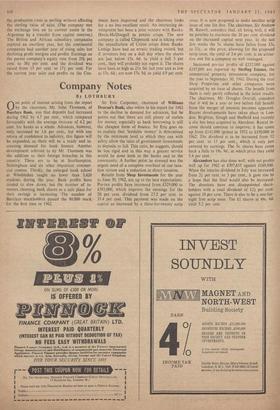Company Notes
By LOTHBURY NE point of interest arising from the report
by the chairman, Mr. John Thomson, of Barclays Bank, was that deposits had increased during 1962 by 4.7 per cent., which compared favourably with the average increase of 4.2 per cent. for banks as a whole. Advances, however, only increased by 1.6 per cent., but with any return of confidence to industry, this figure will be expanded, as there will be a ready and in- creasing demand for bank finance. Another development referred to by Mr. Thomson was the addition to their foreign branches in this country. These are to be at Southampton, Nottingham and six other important commer- cial centres. Thirdly, the enlarged bank school at Wimbledon taught no fewer than 3,420 students during the year. Bank profits have tended to slow down, but the number of in- vestors choosing bank shares as a safe place for their savings is increasing. The number of Barclays stockholders passed the 80,000 mark for the first time in 1962. Sir Eric Carpenter, chairman of Williams Deacon's Bank, also refers in his report for 1962 to the decline in demand for advances, but he points out that there are still plenty of outlets for money, especially as bank borrowing is still the cheapest form of finance. Sir Eric goes on to explain that 'lendable money' is determined by the minimum level to which they can with safety allow the ratio of government investments to deposits to fall. This ratio, he suggests, should be less rigid and in this way a greater service would be done both to the banks and to the community. A further point he stressed was the urgent need of a complete overhaul of our taxa- tion system and a reduction in direct taxation.
Results from Shop Investments for the year to June 30, 1962, are up to the best expectations. Pre-tax profits have increased from £329,000 to £393,000, which improve the earnings for the 20 per cent. dividend from 27,2 per cent. to 35.4 per cent. This payment was made on the capital as increased by a three-for-twenty scrip issue. It is now proposed to make another scrip issue of one for five. The chairman, Sir Andrew H. Rowell, considers that, all being well, it will be possible to maintain the 20 per cent. dividend on the increased capital next year. In the last few weeks the 5s. shares have fallen from 37s. to 32s.; at this price, allowing for the proposed scrip issue, the yield of 3.6 per cent. is an attrac- tive one for a company so well managed.
Increased pre-tax profits of £257,000 against £197,000 are reported by Sterling Estates, the commercial property investment company, for the year to September 30, 1962. During the year Shop Properties and other companies were acquired by an issue of shares. The benefit from them is only partly reflected in the latest results. The chairman, Mr. Douglas Overall, considers that it will be a year or two before full benefit from the merger of interests becomes apparent. Recent developments have taken place in Lon- don, Brighton, Slough and Sheffield and recently a site has been acquired in Aberdeen. Rental in- come should continue to improve; it has come up from £141,000 (gross) in 1952 to £450,000 in 1962. The dividend is to be increased from 12 per cent. to 13 per cent., which is only just covered by earnings. The 5s. shares have come back a little to 18s. 9d., at which price they yield 3.4 per cent.
Alexanders has also done well, with net profits well up for 1962 at £307,655 against £169,946. When the interim dividend in July was increased from 21 per cent. to 3 per cent., it gave rise to a hope that the final would also be increased. The directors have not disappointed share- holders with a total dividend of 121 per cent. against 10 per cent. There is also to be a one-for- eight free scrip issue. The £1 shares at 49s. 6d. yield 5.2 per cent.


































 Previous page
Previous page